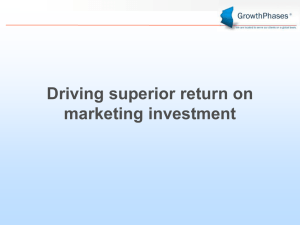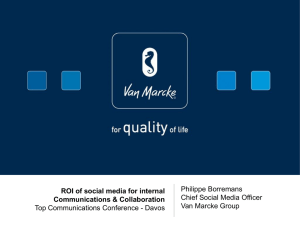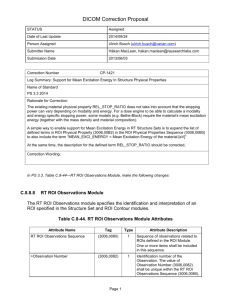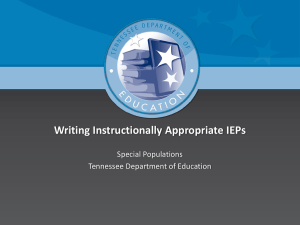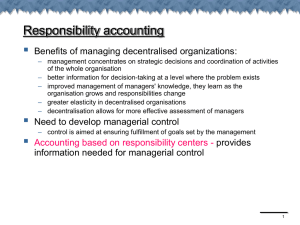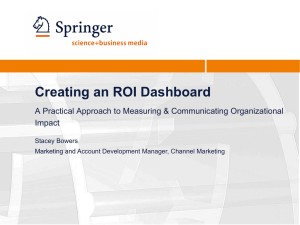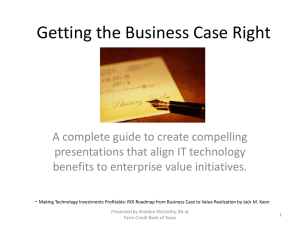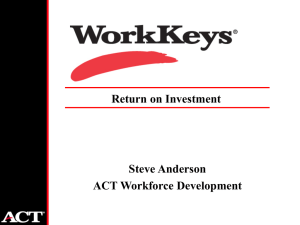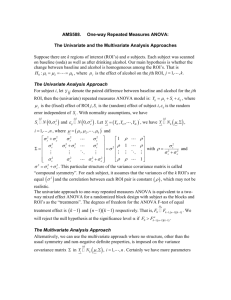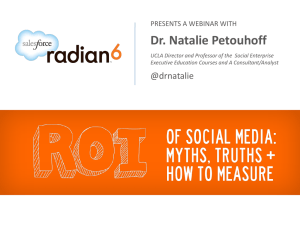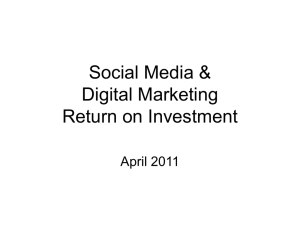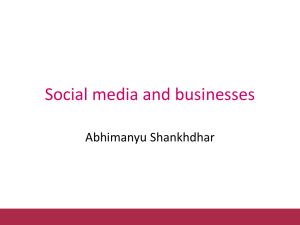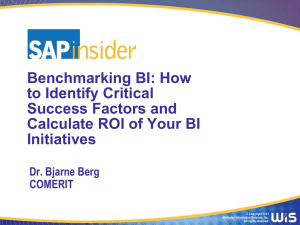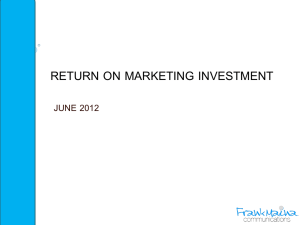10 Steps to Preparing a Successful Business Plan
advertisement
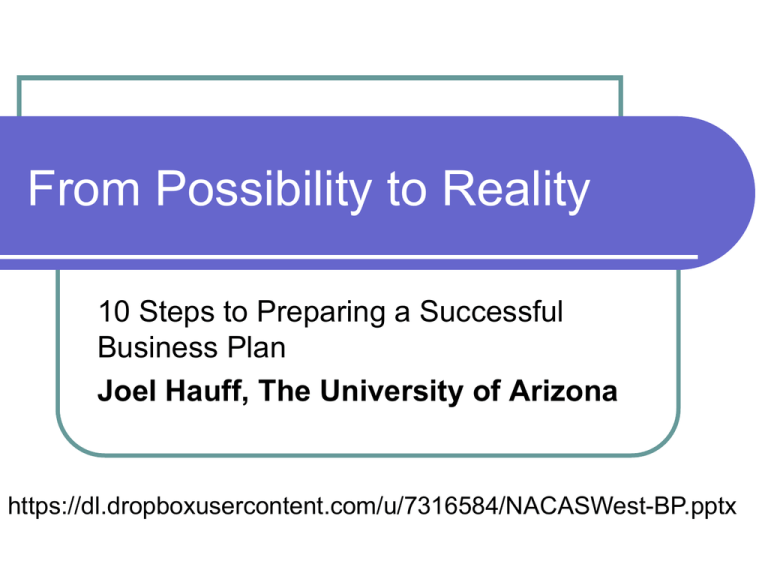
From Possibility to Reality 10 Steps to Preparing a Successful Business Plan Joel Hauff, The University of Arizona https://dl.dropboxusercontent.com/u/7316584/NACASWest-BP.pptx Outline Identify the steps in developing a business plan Examine each step and discuss how it fits into the overall plan Relate each step to real-life examples Spend some time working on your own personal business plan From Possibility… The POWER of an idea Horse In Around Pet Care …To Reality! What is your big IDEA? How can you MAKE IT HAPPEN? Business Plan Steps Step 1 – Pitch Your Business Step 2 – Define Your Business Model Step 3 – Detail Your Marketing Plan Step 4 – Identify Your Target Markets Step 5 – Explain Your Sales Model Business Plan Steps (continued) Step 6 – Identify Opportunities for Success Step 7 –Supply Key Assumptions Step 8 – Conduct a Cost-Benefit Analysis Step 9 – Detail the Return On Investment (ROI) Step 10- Develop a Plan for Assessment Step 1 – Pitch Your Business You should be able to explain in 15 seconds what your concept is, and why it is compelling (1-3 sentences) The strategic investment of resources for a phased Student Union Memorial Center Master Plan will reenergize the facility with services and spaces demanded by the current generation of students. In turn, this will allow for us to recruit a higher caliber of student and retain them more successfully over time. Step 2 – Define Your Business Model How will you generate revenue? AND/OR How will you save money? AND/OR How will you increase the level or quality of service to your customers? Business Planning Model People Make Decisions Revenues & Expenses Occur Decisions Evaluated Outcomes Reported Business Planning Model People Make Decisions Revenues & Expenses Occur We spent money on renovations, got new business and had to take care of it. Outcomes Reported Let’s renovate the facility! Here’s what the facility renovation did for us! Program Evaluation Was it worth it? Business Model Student Union Master Plan Move ‘destination points’ to lower level Add new retail concepts based on student trends to increase student satisfaction Add additional point-of-sale opportunities to increase revenues and decrease lines Add additional interior and exterior seats to increase customer capacity Complete the exterior portions of the building with intentional seating, canopies and more-welcoming entry points Marketing vs. Selling What is the difference between marketing and sales? “Selling is getting rid of something you’ve got. Marketing is having something you can get rid of.” Each requires a different range of skills and knowledge for success Both are dependent upon one another Step 3 – Detail Your Marketing Plan How will you pitch your idea to customers and strategic partners? What options do you have to market to them? Which will be the most effective? Marketing – The 4 P’s The strategic elements of a marketing plan Product – what are we going to sell Price – what do we need to charge for it Promotion – how do we let people know about it Placement – where do we sell it Marketing strategies are applied globally Marketing Plan – Specific Details Product – Einstein Bros. Bagels Price - Varies Promotion – Social Media, Limited Print Media, Coupon Books, Digital Signage Placement – Facebook, Twitter, Arizona Daily Wildcat, Student Insider, Camptoons, Union Channel 12 Marketing Plan Product – SUMC Phased Renovation Plan Price - $6.5 million Promotion – Surveys, Focus groups, Information Sessions, 1-on-1 Meetings Placement – Student constituencies, Admissions, Campus Life, Institutional Leadership Step 4 – Identify Your Target Markets What is (are) your unique target market(s)? Students – need to know they support this priority and possible pricing for services Senior Vice President for Business Affairs – need him to fund the plan Step 5 – Explain Your Sales Model Summarize and explain how you intend to capture customers (or gain support) for your business model Who are you selling to? What are your sales strategies? Who are your strategic partners (if any)? Sales Steps Introduction Discovery (Background) Presentation Follow-up Closing Sales Model Who Student Constituencies What Strategies Architectural renderings Anecdotal data regarding student engagement Light financial data showing sustainability Strategic Partners Vice President for Student Affairs Sales Model Who Vice President for Business Affairs What Strategies Survey Data Detailed Pro Forma Data Light anecdotal data regarding student engagement Strategic Partners Vice President for Student Affairs Step 6 – Identify Opportunities for Success Conduct a SWOT analysis: What are your idea’s Strengths? What are your idea’s Weaknesses? What are your idea’s Opportunities? What are your idea’s Threats? SWOT Assessment Strengths - physical or serviceoriented advantages Weaknesses - physical or serviceoriented limitations SWOT Assessment Opportunities - external plans, interests or forces that contribute to your ability to succeed Threats - external plans, interests or forces that work against your immediate goals Step 7 – Supply Key Assumptions With any plan, there is some guesswork involved What elements of the plan can make or break it? Budget projections for construction costs are realistic Have not reached point-of-sale saturation point Student survey data is representative of the total population Sales estimates are realistic Step 8 – Conduct a Cost-Benefit Analysis (Pro Forma) Money talks What will your revenues be under this business plan? What will your costs (direct and indirect) be under this business plan? What benefit(s) will be gained? What is the bottom line? Step 9 – Detail the Return On Investment (ROI) How long will it take to see a return on any investment made? What are the projected minimum and maximum returns? What are the factors that will increase (or diminish) ROI? Defining The Business Plan What is my plan for increasing ROI? How will you generate revenue? AND/OR How will you save money? AND/OR How will you increase the level or quality of service to your customers? Calculating ROI The simplest way to calculate ROI is: ROI = [Gain from Investment] – [Cost of Investment] * 100% [Cost of Investment] ROI = [100,000] – [75,000] * 100% = 33.33% [75,000] Increasing ROI There are three structured ways to increase ROI: [Gain from Investment] increases while [Cost of Investment] remains the same [Cost of Investment] decreases while [Gain from Investment] remains the same [Cost of Investment] increases, but [Gain from Investment] also increases to a larger proportion than the [Cost of Investment] ROI = [Gain from Investment] – [Cost of Investment] * 100 [Cost of Investment] Modeling Profit & ROI Addition of Web Registration Service for Customers Current ROI = 33.33% Increase in Costs by $8,000 for new business component ROI = [x] – [83,000] * 100% = 33.33% [83,000] ROI = [x] – [83,000] = [83,000] * .3333 ROI = [x] = 110,663.90 ROI = Gain Increase of 10,663.90 ROI = [110,664] – [83,000] X 100% = 33.33% [83,000] Modeling Profit & ROI How can I do this on a global scale for my idea? Pro Forma Documents Profit/Loss Statements Cash Flow Summaries Microsoft Excel as a tool Step 10 – Develop a Plan for Assessment How will we measure our ‘success’? How often will we measure it? What will we specifically measure? What are the critical milestones to achieve? How long will we give our plan to be successful before we make changes or pull the plug altogether? Business Plan – Summary Assemble all information into an executive summary document No more than 2-3 pages or 10 PowerPoint slides Tailored to a specific audience Printed and bound Closing Think BIG – no idea is too impossible to explore Let your PASSION for your idea come through in your preparation for and presentation of it Be HONEST – with yourself and with others around you Do the WORK to prove your idea has merit and can be achievable
